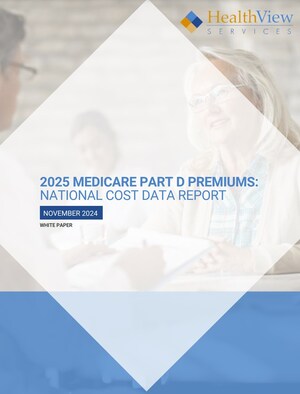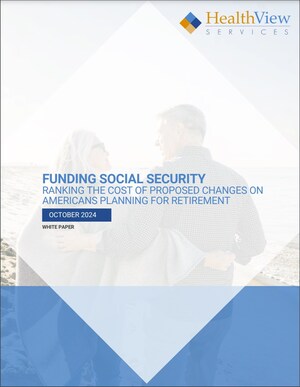New White Paper Outlines Strategies to Address Coming Retirement Health Care Cost Crisis
HealthView Insights white paper highlights retirement health care cost planning gap and steps to manage and reduce costs
DANVERS, Mass., June 10, 2014 /PRNewswire/ -- A new white paper from HealthView Services, the leading provider of retirement health care cost data, highlights a coming retirement health care cost crisis and gap in planning for retirement health care costs. The HealthView Insights paper, "Addressing the Retirement Health Care Cost Crisis: Strategies to Manage Costs," notes that despite growing concern about retirement health care costs, many financial advisors and their clients have yet to meaningfully integrate health care costs into retirement plans.
Drawing upon HealthView Services' retirement health care cost data from more than 50 million annual health care cases, calculated using an actuary and physician reviewed methodology that determines individual longevity and retirement health care costs, the paper shows that retirement health care costs are on a path to exceed Social Security Benefits for many Americans, but notes there are steps advisors and individuals can take to help clients manage or reduce costs.
"Until recently, retirement health care costs haven't been included in retirement planning for several reasons. First of all, many clients mistakenly believe that Medicare will cover all or part of their health care costs in retirement. Meanwhile, their advisors — who have been focused on rebuilding assets following the financial crisis — haven't had the tools to calculate healthcare costs for individuals," said Ron Mastrogiovanni, Founder and Chief Executive Officer, HealthView Services. "As a result, many retirement plans are failing to take into account a cost so big that it may exceed the Social Security benefits families are relying on for their retirement."
The paper highlights a number of key issues and drivers impacting retirement health care costs including: the underestimation on the part of clients of how much they will have to pay for health care in retirement; the impact of health care cost inflation; pressure on the Medicare system, which will lead to costs being shifted to retirees; Medicare means testing, resulting in people with higher levels of retirement income paying significantly higher premiums; and increased longevity.
"Retirement health care is a much bigger cost issue than people expect or realize," added Mastrogiovanni. "There is an urgent need to address the retirement health care cost planning gap. The failure to do so will put millions of Americans' retirement security at risk."
The white paper notes that the starting point for addressing the challenge of retirement health care costs is being aware of expected costs for individuals. Furthermore, calculating expected client longevity based on gender, health and other factors such as state of residence and income is argued to be key to providing realistic cost estimates that drive retirement planning decisions.
Using a case study, the white paper highlights strategies that can be used to manage and lower expected retirement health care costs. These include managing client income in retirement to maintain a desired Modified Adjusted Gross Income (MAGI) level. Since income from a Roth IRA or certain other savings products such as a universal life policy do not count in MAGI, the use of these products may reduce the income band and Medicare surcharges, saving $100,000 or more in retirement.
The paper notes that knowing when to apply for Social Security, planning to use a certain portion of Social Security for health care costs, and allocating retirement savings or purchasing products for expected costs, can go a long way to ensuring retirees are positioned to meet their expected health care needs.
"We believe that having actuarial-based cost data for individuals, allocating funds for retirement health care costs, managing retirement income through the right mix of products, and optimizing social security, among other strategies, can increase retirement security," added Mastrogiovanni. "Saving for health care may not be the goal most Boomers had in mind when they first started planning for retirement, but given expected health care costs in retirement, it needs to be among the top priorities."
HealthView Services (http://www.hvsfinancial.com) is the leading provider of retirement health care cost data and Medicare, Social Security, and long-term care retirement planning tools for financial advisors and individuals. HealthView Services' HealthWealthLink is an integrated retirement planning tool that draws upon cost data from more than 50 million annual healthcare cases to assist financial advisors in preparing personalized estimates of retirement health care costs and implementing various retirement strategies to achieve clients' retirement goals. Through the company's partnership with the Insured Retirement Institute (IRI), HealthView Prime, a health care retirement cost planning tool, is being offered to the IRI's membership of major insurers, asset managers, broker dealers/distributors and 150,000 financial professionals. Individuals can use a one-click version of HealthWealthLink to calculate average retirement health care costs (http://apps.hvsfinancial.com/hvadvisor).
SOURCE HealthView Services
WANT YOUR COMPANY'S NEWS FEATURED ON PRNEWSWIRE.COM?
Newsrooms &
Influencers
Digital Media
Outlets
Journalists
Opted In






Share this article